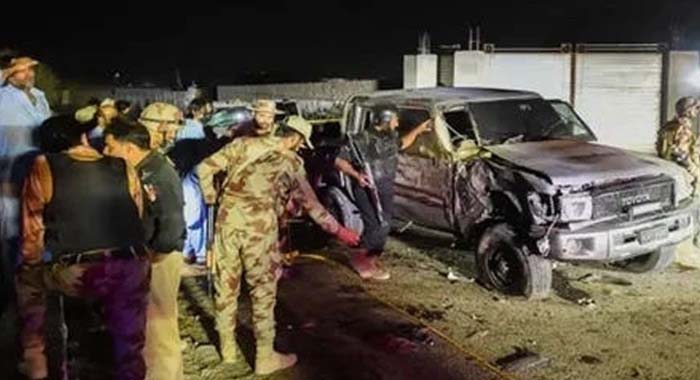A deadly suicide bombing near Shahwani Stadium on Sariab Road in Quetta left 14 people, including a policeman, martyred and 33 others, among them a former MPA, seriously injured on Thursday. Political leaders present at the site narrowly escaped unharmed in what officials described as a major terror strike targeting public representatives.
In a separate incident, security forces foiled a terrorist assault on the Frontier Constabulary Headquarters in Bannu, where militants operating under Indian patronage attempted to storm the facility. In the ensuing exchange of fire, five terrorists were killed, while six soldiers embraced martyrdom in the line of duty.
Officials said the twin incidents once again highlight India’s continued reliance on proxy outfits identified as Fitnat-ul-Hindustan and Fitnat-ul-Khawarij to destabilise Pakistan and the region. “While Pakistan stands as an advocate and guarantor of regional peace, the Indian government remains consumed by war hysteria,” security sources noted, recalling that New Delhi had twice attempted to impose war on Pakistan, only to face humiliating setbacks.
The statement added that the preparedness and professional excellence of Pakistan’s armed forces have consistently thwarted Indian designs, forcing its leadership to rely on intensified proxy warfare. These proxies, officials said, were responsible for a growing number of terrorist incidents in Balochistan and Khyber Pakhtunkhwa, aimed at undermining Pakistan’s internal stability.
The Shanghai Cooperation Organisation (SCO) summit in Tianjin recently condemned terrorist attacks in both Pakistan and India, urging broader humanitarian cooperation among member states. Chinese President Xi Jinping called for a global order built on mutual respect, equality, and cooperation. The SCO declaration advised against exploiting extremist or separatist groups for narrow objectives — a point long stressed by Pakistan, particularly regarding Baloch separatist groups it accuses of receiving direct support from Indian agencies.
Officials said this affirmation of principle strengthened Pakistan’s stance, especially as India has often accused Islamabad of backing separatists in Kashmir, a charge Pakistan has repeatedly rejected. By contrast, Pakistani authorities point to confessions, arrests, and recent surrenders of Fitnat-ul-Hindustan militants as proof of India’s direct role in funding and directing terror in Balochistan. The cowardly May 21 attack targeting innocent children was cited as one example of this agenda.
The United Nations has also documented the external backing of militant groups targeting Pakistan. A recent UN report stated that Tehreek-e-Taliban Pakistan (TTP) continues to receive financial and logistical support from across the border in Afghanistan, where its capabilities remain intact. Islamabad has repeatedly urged the Afghan government to rein in these militants, though officials say little action has been forthcoming.
Security experts recalled that over the past 10–15 years Pakistan endured some of the bloodiest phases of terrorism, with daily bombings targeting schools, hospitals, transport hubs, markets, and even mosques. They noted that the sacrifices of Pakistan’s armed forces drove the militants out of urban centres and villages, pushing them across the border. “Today our playgrounds are active again, the economy is stabilising, interest rates and inflation are receding, and the rupee has steadied gains that terrorists and their sponsors cannot digest,” an official observed.
The report further underlined that extremist violence in India is deeply rooted in the ideology of Hindutva, a hard-line Hindu nationalist doctrine that envisions transforming India into an exclusivist Hindu state. Prime Minister Narendra Modi has been described as a chief proponent of this ideology, which has historically targeted Muslims, the largest minority in India.
For Pakistan, which remains the only nuclear power in the Muslim world despite the loss of its eastern wing in 1971, Indian hostility since independence has manifested in repeated attempts to weaken and destabilise the country. Officials stressed that Pakistan’s posture has always been defensive, dictated by Indian aggression and regional security realities.
The recent SCO summit underscored the importance of joint action against terrorism and extremism, rejecting double standards and urging the international community to strengthen cooperation under the UN framework, including measures against cross-border terrorist movements and the financing of militant organisations.
Officials cautioned that foreign-operated social media accounts continue to target Pakistani youth with propaganda, while certain political groups risk being used as tools to serve hostile agendas. “Our young generation must reflect whether their actions inadvertently benefit terrorists, and our political parties too must put national interest above short-term political gains,” the statement emphasised.
Analysts concluded that history shows nations succeed against extremism when unity, awareness, and resilience converge. Pakistan, they said, has stood firm through immense trials and must continue on the path of a peaceful, terror-free future. “The fight against terrorism is a long journey,” they stressed, “marked by setbacks and successes, but with a firm resolve and a comprehensive strategy, the day will come when Pakistan will be a cradle of peace, stability, progress, and prosperity.”
—





